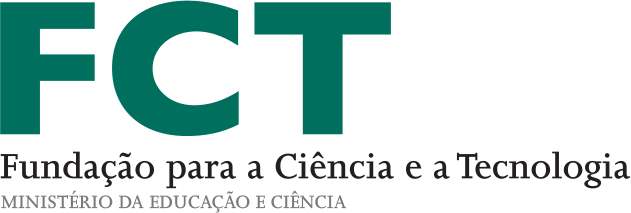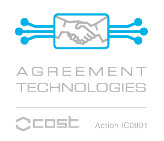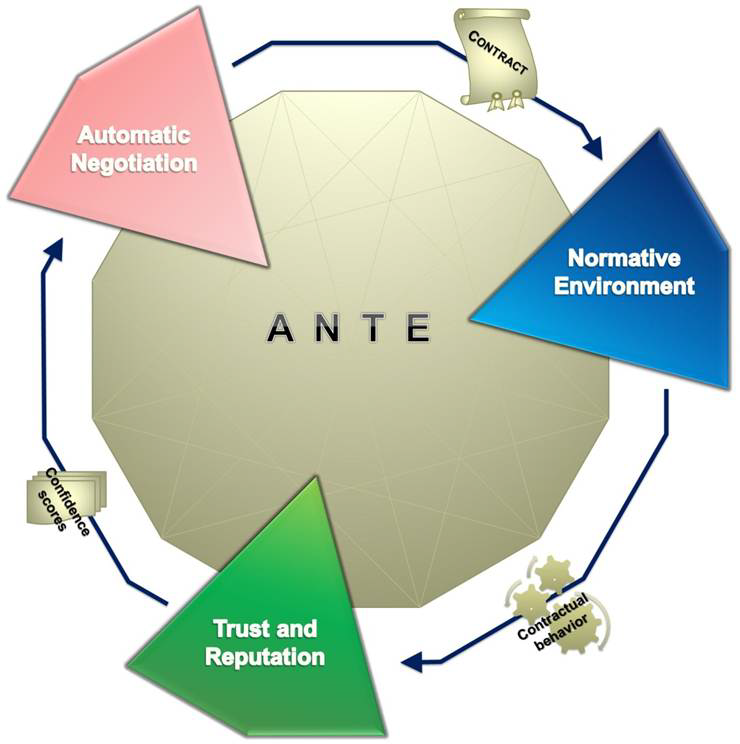Funded Projects
Trust-aware Automatic E-Contract Negotiation in Agent-based Adaptive Normative Environments (FCT Project PTDC/EIA-EIA/104420/2008)
Virtual Organizations (VO) are a
major trend in cooperative business. Specialization and flexibility are
some of the key aspects of an every day more dynamic and global market.
The concept of VO has been applied to many forms of cooperative
business relations, like
Commercial relationships between business partners in the digital economy are increasing in flexibility, and business deals tend to be created whenever a business opportunity arises. Moreover, the instability in demand increases the need for enterprises to search for new partners, with an associated risk of dealing with entities whose previous performance might be unknown beforehand. Therefore, enterprises need mechanisms that allow, not only to evaluate the confidence they have on current or potential partners (and to monitor this confidence in a continuous and automatic way), but also to prevent deceptive behaviours from partners or assist on reacting upon them when prevention is not possible. In pursuing such a desiderate, several research communities (e.g. social sciences, psychology, economics, and distributed artificial intelligence) are studying and proposing approaches for the development of trust and reputation models, to be applied in the automation of the partner selection process. Also, research is being done on the use of these models in the areas of contract establishment and enforcement.
We have developed, over the last years, a computational platform called Electronic Institution (EI) that aims at supporting software agents’ interactions as a coordination framework, by assisting the establishment of business agreements through appropriate electronic contracting services. Furthermore, the EI also aims at promoting trust by offering an enforceable normative environment, enriched with a background normative framework facilitating contract establishment.
In this project, we propose to enrich the EI by studying and developing models that concern the relationship between trust and reputation and normative environments, a promising area of research referred to in the literature (e.g. [CoPa02]) but that, to our knowledge, has not yet been explored in a practical way. More specifically, we plan:
i) To develop a computational trust and reputation (CTR) system that estimates the future behavior of partners taking as input, along with the traditional aggregation of social evaluations, the context of the business under appreciation and the similarities among different businesses and amongst partners, in an effort to approximate this procedure to human reasoning in the partner selection process. We intend to develop this “contextual CTR” using methodologies derived from the probabilistic and data mining fields.
ii) To go one step further in the contract negotiation process. Instead of instantiating predefined contract templates, agents should be able to automatically negotiate specific contract clauses, using trust information as input. Therefore, in this topic we will specify contracts that are amenable to be partially negotiated in an automatic way (using a contract model and language that we have already developed), and negotiation protocols that address contract parameters and clauses. Furthermore, contract negotiation strategies will be developed that allow agents to successfully negotiate in an automated way.
iii) To adapt both the EI’s normative framework and the enforcement mechanisms in place towards the actual performance of contractual partners, in order to avoid constraining the environment more than it is strictly necessary. Moreover, the effectiveness of trust and reputation mechanisms that are in place should be taken into account when addressing such adaptation. In this topic, we will investigate case-based reasoning and unsupervised learning approaches that enable us to enrich the normative environment with adaptation and evolution features.
An underlying goal of this project is the collection of real data from professional and industrial associations or electronic markets, and the generation of simulated data validated through empirical evidences obtained from industry.
The main expected results of this project are:
1 – A model of a CTR system that enriches the process of computing trust values by taking as input contextual information;
2 – A model for the adaptive selection of enforcement policies based on the evolving characterization of an agent population;
3 – A model for automatically negotiating contractual conditions taking into account the trust values derived from the CTR system;
4 – A prototype that integrates the global solution for selection of partners and contract negotiation in the EI – in our view, a fundamental step towards the automation of inter-organizational relationships;
5 – The dissemination of the developed models, experimental results and validation of the prototype to the research community.
6 – The completion of 2 PhD theses and at least 1 MsC thesis.
This project will build on previous work of the involved participants. These include knowledgeable researchers in the project’s main research domains, namely PhD specialists in multi-agent systems and data acquisition/analysis, and two PhD students working in the areas of trust/reputation and normative environments for B2B.
Commercial relationships between business partners in the digital economy are increasing in flexibility, and business deals tend to be created whenever a business opportunity arises. Moreover, the instability in demand increases the need for enterprises to search for new partners, with an associated risk of dealing with entities whose previous performance might be unknown beforehand. Therefore, enterprises need mechanisms that allow, not only to evaluate the confidence they have on current or potential partners (and to monitor this confidence in a continuous and automatic way), but also to prevent deceptive behaviours from partners or assist on reacting upon them when prevention is not possible. In pursuing such a desiderate, several research communities (e.g. social sciences, psychology, economics, and distributed artificial intelligence) are studying and proposing approaches for the development of trust and reputation models, to be applied in the automation of the partner selection process. Also, research is being done on the use of these models in the areas of contract establishment and enforcement.
We have developed, over the last years, a computational platform called Electronic Institution (EI) that aims at supporting software agents’ interactions as a coordination framework, by assisting the establishment of business agreements through appropriate electronic contracting services. Furthermore, the EI also aims at promoting trust by offering an enforceable normative environment, enriched with a background normative framework facilitating contract establishment.
In this project, we propose to enrich the EI by studying and developing models that concern the relationship between trust and reputation and normative environments, a promising area of research referred to in the literature (e.g. [CoPa02]) but that, to our knowledge, has not yet been explored in a practical way. More specifically, we plan:
i) To develop a computational trust and reputation (CTR) system that estimates the future behavior of partners taking as input, along with the traditional aggregation of social evaluations, the context of the business under appreciation and the similarities among different businesses and amongst partners, in an effort to approximate this procedure to human reasoning in the partner selection process. We intend to develop this “contextual CTR” using methodologies derived from the probabilistic and data mining fields.
ii) To go one step further in the contract negotiation process. Instead of instantiating predefined contract templates, agents should be able to automatically negotiate specific contract clauses, using trust information as input. Therefore, in this topic we will specify contracts that are amenable to be partially negotiated in an automatic way (using a contract model and language that we have already developed), and negotiation protocols that address contract parameters and clauses. Furthermore, contract negotiation strategies will be developed that allow agents to successfully negotiate in an automated way.
iii) To adapt both the EI’s normative framework and the enforcement mechanisms in place towards the actual performance of contractual partners, in order to avoid constraining the environment more than it is strictly necessary. Moreover, the effectiveness of trust and reputation mechanisms that are in place should be taken into account when addressing such adaptation. In this topic, we will investigate case-based reasoning and unsupervised learning approaches that enable us to enrich the normative environment with adaptation and evolution features.
An underlying goal of this project is the collection of real data from professional and industrial associations or electronic markets, and the generation of simulated data validated through empirical evidences obtained from industry.
The main expected results of this project are:
1 – A model of a CTR system that enriches the process of computing trust values by taking as input contextual information;
2 – A model for the adaptive selection of enforcement policies based on the evolving characterization of an agent population;
3 – A model for automatically negotiating contractual conditions taking into account the trust values derived from the CTR system;
4 – A prototype that integrates the global solution for selection of partners and contract negotiation in the EI – in our view, a fundamental step towards the automation of inter-organizational relationships;
5 – The dissemination of the developed models, experimental results and validation of the prototype to the research community.
6 – The completion of 2 PhD theses and at least 1 MsC thesis.
This project will build on previous work of the involved participants. These include knowledgeable researchers in the project’s main research domains, namely PhD specialists in multi-agent systems and data acquisition/analysis, and two PhD students working in the areas of trust/reputation and normative environments for B2B.




